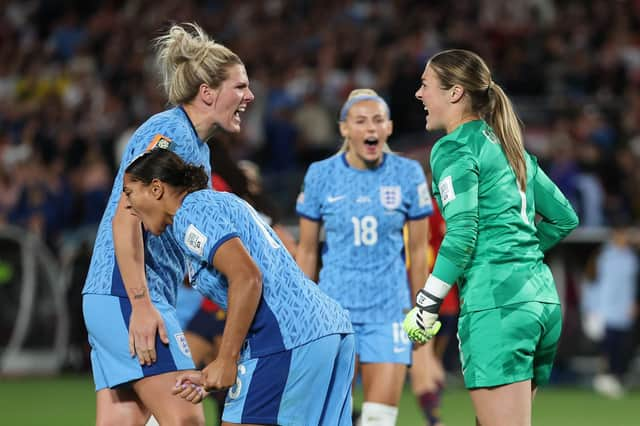The worst aspects of the men's game have entered women's football - Aidan Smith


Correction: I loved the football, the vast bulk of it at any rate. Great endeavour, high level of skill, passionate crowds. But why did the players have to copy so much of what is tedious, conniving, cynical and depressing about the men’s game?
Take the ritual of the tunnel before kick-off, though how this should have become a ritual I don’t know. On Sunday the England Lionesses’ captain Millie Bright did what the vast majority of her male counterparts do and stare straight ahead. Right next to her was Olga Carmona, leader of the Spain team, who glanced across to Bright, her smile suggesting she was keen to engage her rival in some friendly conversation, maybe wish her good luck.
Advertisement
Hide AdAdvertisement
Hide AdThe teams were kept in the tunnel for a few minutes which made Bright’s boot-faced demeanour seem awkward and just silly. Carmona - who would go on to score the World Cup-winning goal and learn afterwards that her father had died - tried again but Bright kept up her act.
And it must be an act, right? There’s the whole lead-up to the tunnel when captains will have been mentally readying themselves for the game without it all coming down to this moment. Men will hope to look macho, brave and heroic with their faces of stone but it’s all just pantomime.
I’d hoped the women could be different - more sisterly, perhaps, if it’s not being sexist to suggest as much - because as far as I know there is no handbook written by men on how women should behave as footballers.
But it’s like such a manual does exist and they’re feeling obliged to follow it. For why do they steal yards at throw-ins like the men? Why do they kick the ball away when fouls are awarded against them? Why do they time-waste? Why do they dive? Why do they cheat? And en route to the final why did England’s Lauren James mimic what so many men have done before her and stamp on a Nigerian girl’s back?
It’s not every woman who’s behaving like this all of the time but there’s enough bad stuff from men’s football which has been transferred without quibble into the women’s game to be depressed about a missed opportunity. This World Cup may still advance women’s football hugely, and I hope it does, but what a shame that a giant smelly holdall of unsporting male behaviour has been packed for the journey.
It is not unsporting to cover your mouth with your hand when talking to a team-mate but why do women do this other than to adhere to established male practice?
It is unsporting, though, when the opposition have been awarded a penalty, to attempt to mess with the kick-taker’s concentration by instigating a fatuous claim that the ball has not been properly spotted. Lucy Bronze, MBE, 112 caps for England, did this in the final.
The penalty was duly missed. The England players taunted Jennifer Hermoso about this and the Spaniard responded with a middle-finger gesture. Perhaps she was reminding the Lionesses that her team were still leading 1-0.
Advertisement
Hide AdAdvertisement
Hide AdOr maybe she was annoyed by Bronze’s attempt to put her off, and by the England goalkeeper Mary Earps illegally leaving her line to make the save. Earps celebrated her stop by screaming “F*** off!” Then again, that outburst could have been directed at Rishi Sunak or Prince William, president of the Football Association, for neither bothering to attend the final.
This was a super-tense moment in the game and the extreme reactions were perhaps understandable. What was infuriating was the - female - commentators’ casual reference to the “dark arts” of gamesmanship, then making no further comment about them.
None, at least, when England were the practitioners. But there was a whinge about the Lionesses being “pulled or chopped” only to be “given nothing”, while the dastardly Spanish needed no persuasion to collapse in heaps.
Yes, the commentary box for England’s women is just as jingoistic as the one for England’s men. And just as quick, from high in the grandstand, to offer a definitive prognosis on the true extent of injuries down on the field. And just as ready to roll out the dreary cliches like “dark arts” with players having “felt contact” in the act of “drawing the foul” - all euphemisms for conning the referee.
You can probably tell that I’m not enjoying my football tremendously right now. The men are entirely to blame for this disenchantment but maybe it’s too much to have expected the women to have come up with an entirely new version of the game - and the commentators an entirely new language - because it was still possible to enjoy large chunks of the World Cup, to marvel at the talents of Nigeria, Colombia and the tiki-taka temptresses of Spain, and to want the women’s game - following the example of the champions’ impossibly long-legged striker Salma Paralluelo - to take that giant leap forward.
For the Lionesses, there had already been too much expectation, too much pressure. No fault of theirs, but just like England’s men in big tournaments they’d been overhyped.
Still, when Argentina’s men won their World Cup last year, their goalie collected his trophy for being the best keeper and promptly stuck it between his legs. At least Mary Earps, recipient of the equivalent prize, did not copy his juvenile prank.